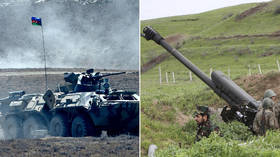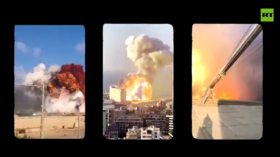Is reconciliation between Armenia and Azerbaijan possible or is another war looming?

Relations between Armenia and Azerbaijan remain tense after a recent escalation of border hostilities. Is there a solution to the decades-long conflict or will it lead to another bloody war between these former Soviet republics?
Last week, units deployed at the Russian 102nd Military Base in Armenia conducted training exercises that involved over 1,500 troops and 500 vehicles and hardware such as MiG-29 fighter jets and Mi-24P and Mi-8MTV helicopters.
Just across the border, Azerbaijan is currently holding large-scale tactical exercises with Turkey. Military formations and units from both countries are practicing high-alert combat readiness.
At the same time, the Armenian armed forces are undergoing snap combat-readiness checks, and certain units and formations are being put on high alert and brought to combat readiness in line with their operational assignments.
This comes against the backdrop of a recent armed confrontation on the Armenia-Azerbaijan border. The relations between the two South Caucasus states have long been strained. In the early 1990s they fought a bloody war after an Armenian-populated enclave inside Azerbaijan – Nagorno-Karabakh – declared independence from Baku. The war ended with a ceasefire agreement, after which Nagorno-Karabakh became an unrecognized republic, closely allied with Armenia.
In light of the latest escalation of the conflict, there’ve been plenty of prognoses about how a potential all-out war between Armenia and Azerbaijan would play out. As a rule, in such cases experts compare the number of tanks, guns, mortars, and war planes in each country’s arsenal, and also look closely at the specs of tactical missile systems and multiple rocket launchers.
Also on rt.com Azerbaijan says 3 of its soldiers killed in border clash with Armenian troops, sparking fears of new escalationArsenals are undoubtedly very important, but they are far from being the main factor in a military conflict. If we take Arab-Israeli wars – say, the 1973 Yom Kippur War – we can see that Cairo, Damascus and Amman considerably outmatched Jerusalem in many aspects, but the outcome for the Arab forces was tragic. They achieved none of the strategic goals they’d set, while their losses in terms of human life and military equipment were several times higher compared to Israel’s.
Assessing the respective strategic military and economic potentials of Baku and Yerevan, we can conclude that at this point Azerbaijan is far superior to Armenia when it comes to size, population, GDP and military budget, as well as the amount (and in many cases also the quality) of weapons and military hardware.
Besides that, Azerbaijan has a young population, and it keeps growing, while the country’s economy is developing rapidly. Baku can pay cash to import weapons and military equipment, though a drop in crude oil and gas prices has forced top Azerbaijani political and military officials to somewhat tame their appetites.
However, the main problem of the Azerbaijani Armed Forces lies in the area of the combat experience and professional qualities of both soldiers and commanding officers. The country can’t boast a prominent military past, and thus lacks military traditions or achievements that many other nations have.
Also on rt.com Azeri & Armenian protesters clash in London as tensions between neighbors continue to mount (VIDEO)For instance, in the USSR era, there were very few commanding officers from Azerbaijan in the Soviet Army overall; and in some branches of the union’s armed forces, there were none at all. One cannot be simply appointed to command a regiment or a division without appropriate experience or background. It takes decades of hard work and proper training to produce enough junior officers for a capable army, not to mention higher-ranking commanders. The country’s authorities are fully aware of the problem. Azerbaijan receives a lot of help from Turkey in military training for its officers.
When it comes to Armenia, one should note such factors as its decreasing population, a relatively low GDP rate and insignificant external investments. As a result, the country simply does not have enough funds to afford purchasing new weapons and systems.
So, both nations are facing the same problem: in case their military standoff turns into a long-term operation, how will they be making up for both human losses and losses of weapons and equipment?
Weapons they currently have in their arsenal could be lost very easily at the early stages of a conflict. As for troops, neither nation has an army reserve it can rely on (even though, truth-be-told, Azerbaijan seems to have no shortage of young men who can be drafted).
Also on rt.com Azerbaijani police disperse protesters storming parliament to demand ‘mobilization’ against Armenia amid border escalation (VIDEO)Besides, there’s no clear answer as to where or how each nation would be repairing all its damaged military hardware when the need arises. Our understanding is that, on top of that, neither state has the strategic reserves or arsenals large enough for a prolonged war.
It appears safe to assume that both Baku and Yerevan are aware of all these problems, and that, most likely, serves as a deterrent. As of today, neither nation appears to be ready for the burden of a protracted armed conflict.
When it comes to potential allies that Armenia and Azerbaijan could reach out to in case of an actual armed confrontation, many experts cite Russia and Turkey. However, both Moscow and Ankara would find it very difficult to formulate a military-political rationale for participating in such a conflict – let alone to convince the majority of their people at home. In that respect, both countries are similarly constrained.
Is there a chance for reconciliation between Armenia and Azerbaijan? It is widely believed that the Nagorno-Karabakh conflict can only be resolved by peaceful means, through diplomacy and negotiations and, because of that, every effort should be made to prevent any further escalation. This includes, among other things, active tactical cooperation with key partners in the region.
Also on rt.com Armenia says it shot down Azerbaijani drone as fierce border clashes continue into third day (VIDEO)However, the extent of mutual inter-ethnic enmity is so high at the moment that any attempt at reconciliation, any hint of a compromise, would immediately be rejected in both Yerevan and Baku. In fact, should either of the leaders on both sides voice the possibility of peace, they could be swept away within a day by a wave of populist anger.
In short, it’s a deadlock situation for both Armenia and Azerbaijan, with no obvious way out.
Think your friends would be interested? Share this story!
The statements, views and opinions expressed in this column are solely those of the author and do not necessarily represent those of RT.















